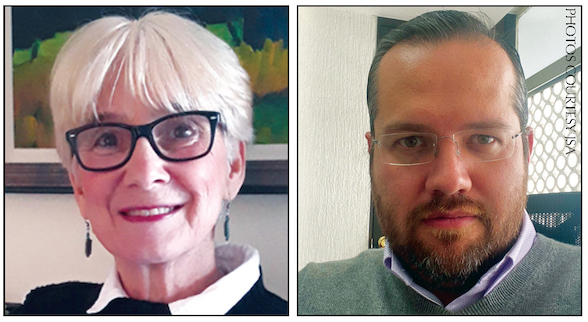Grace Hann, Jewish Seniors Alliance senior peer support services trainer and supervisor, and co-trainer Miguel Méndez. (photos from JSA)
For a senior experiencing loss, isolation, health challenges, a change in housing or other stressors, knowing that someone cares can make a world of difference. Jewish Seniors Alliance’s Peer Support Services trains people aged 55+ to be that someone – seniors helping seniors.
JSA offers at least two peer support training sessions a year, and the next one begins Sept. 20. The training, conducted over Zoom, is free. It comprises 11 sessions, or 44 hours. Participants will learn active listening and other communication skills, how to set boundaries, about aging and the health issues that can accompany it, about available community resources, and more. Upon successfully completing the course, volunteers (who are required to pass a criminal records check) will receive a certificate from Senior Peer Counseling of B.C. and be matched with a senior in the community.
The Jewish Independent spoke with Grace Hann, JSA senior peer support services trainer and supervisor, and co-trainer Miguel Méndez about the program.
JI: When did the peer support program start, and how has its effectiveness been measured?
JSA: The peer support program started in 2011, inspired by [JSA president emeritus] Serge Haber’s vision to support vulnerable seniors in the community. We gauge the program’s effectiveness through detailed statistical analysis. This includes client satisfaction surveys administered after six months, then again after one year, and annually thereafter.
JI: What qualities do your most successful volunteers possess?
JSA: Key qualities for a thriving volunteer-client relationship are empathy, patience and compassion. It’s also crucial for volunteers to be receptive to new ideas during training, which enhances their understanding of the challenges many seniors face.
JI: What is the biggest challenge you face while training volunteers?
JSA: Most volunteers join our training eager to learn and contribute. The training refines their listening skills, helps them establish healthy boundaries, and fosters an understanding of underlying issues many seniors confront, such as grief, loss, and the challenges of connecting with new communities.
JI: What surprises you most about your day-to-day work?
JSA: We’re continually surprised by the deficiencies in our medical and social support system. Many case managers from various health units emphasize their shortage of time and personnel to provide adequate emotional support for seniors. Heart-wrenching sentiments from vulnerable seniors, like “I no longer matter in society” or “My friends have all died,” often resonate with us.
JI: What are the most significant changes you have noticed in the needs of seniors over the last five years?
JSA: There’s a growing mental health support gap for seniors. Many are grappling with conditions like anxiety and depression. At JSA, we receive increased requests from professionals seeking support for such individuals.
However, our volunteers are not mental health experts. While we acknowledge the need, we must be cognizant of our role and limits as volunteers. Additionally, many seniors are anxious due to rising housing and grocery costs, severely affecting those with limited incomes.
JI: How has your training program adapted post-COVID?
JSA: During the pandemic, we transitioned our training to a digital platform, Zoom, allowing many seniors to engage without leaving their homes. We’ve maintained this digital approach, which now attracts participants from a broader geographical range.
JI: Is there a piece of advice or aspect of training that you consider most impactful to your volunteers?
JSA: Role-playing is an exceptionally effective tool. It elicits profound feelings and introspection, heightening volunteers’ empathy and allowing them to better understand others’ experiences. Since our training is experiential, volunteers gain by sharing their own wisdom and experiences.
JI: Anything else you’d like to add?
JSA: Conducting initial client intakes can be deeply emotional. For instance, a recent case involved a 91-year-old woman, previously independent, whose life altered drastically after a spine fracture from a fall. With no family and deceased friends, she faced a significant emotional void. While we can’t mend her physical injuries, we can offer invaluable emotional support, offering hope and the comfort of knowing someone cares. This not only benefits her but also gives our volunteers a sense of purpose and the gratifying feeling that comes from assisting others.
If you’re interested in joining JSA’s peer support team, call 604-267-1555 or email [email protected] or [email protected]. More information at jsalliance.org.
Alisa Dressler is a fourth-year student at Queen’s University in Kingston, Ont. She is an avid reader and writer, and the online director of the arts and culture publication MUSE Magazine. Bressler is a member of the Vancouver Jewish community, and the inaugural Baila Lazarus Jewish Journalism Intern.

